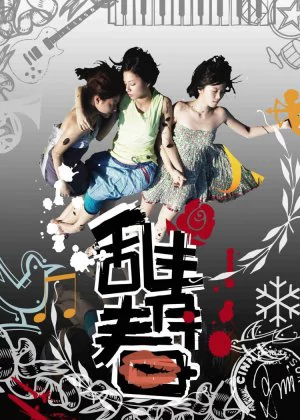Beautiful Crazy
Beautiful Crazy [Luan Qing Chun] is a slightly older Taiwanese film, predating the recent Taiwanese revolution by a full two years. Watching it, you can feel how Chi Y Lee (Blowfish, Taipei 24h) was already laying the foundations for what would be a welcome freshening up of Taiwanese cinema. Beautiful Crazy is a playful, modern and slightly challenging coming of age film, made by one of the most talented of the current batch of Taiwanese directors.
![screen capture of Beautiful Crazy [Luan Qing Chun]](/thumbs/img/articles/1200xauto/beautiful-crazy-1.webp)
Working your way backwards through a director's oeuvre can be a bit tricky. You never know when (and if) you'll hit a serious drop in quality. Blowfish made a pretty big impression on me when I first watched it, lucky for me Beautiful Crazy didn't disappoint at all. While it isn't as accomplished or precise as Lee's later work, it does make up with a warm and naive charm that builds up slowly but deliberately as the film progresses.
Thematically Beautiful Crazy reminded me of Leste Chen's Eternal Summer. A similar love/friendship triangle develops in the midst of a coming of age drama. Instead, this time around we're looking at a trio of girls and one boy. While Beautiful Crazy inevitably touches upon the homosexual feelings of one of the girls, Lee doesn't make too big a deal of it, keeping it a more personal affair rather than a statement. A more subtle approach I greatly appreciated.
The film starts with a cozy table conversation between Xiao-bu and Ah Mi, two girls who spend most of their time together. Xiao-bu tells Ah Mi about a former high school friend (Angel) she used to hang out with, before Angel confessed her feelings to Xiao-bu. Soon after this duo of friends becomes a trio when Xiao-bu hooks up with a young boxer, and they become a couple. Ah Mi doesn't mind Xiao-bu's boyfriend hanging around, but Xiao-bu suspects there is more going on than meets the eye.
![screen capture of Beautiful Crazy [Luan Qing Chun]](/thumbs/img/articles/1200xauto/beautiful-crazy-2.webp)
Visually speaking there is a lot to like about Beautiful Crazy. The image quality isn't perfect, but a strong mix of agile and more handheld-like camera work and meticulously planned camera trajectories, combined with sharp and stark editing make for a very poetic visual language. Lee's camera seems to stutter and float at the same time, abandoning logical flows and creating a collage of images that build up a unified atmosphere.
Once again Lee picks a more traditional soundtrack, a selection of soft piano tunes, subtle guitar pieces and magnificent string ambient. It's not a very challenging soundtrack but it blends incredibly well with the images and aptly enhances the overall poetic vibe. The music in the last scene, running well into the credits, is of spectacular beauty, leaving me behind half entranced and absolutely satisfied. Lee demonstrates that a soundtrack doesn't have to be wildly original or different to make a big impression.
As for the acting, all leads put in a great performance. They all bring a very natural and realistic aura to their characters, which goes a long way in making the drama work. There isn't much of a secondary cast, except for Angel's father who has a rather static but strangely enigmatic role. Good acting all over, not always a given with such a young and inexperienced cast.
![screen capture of Beautiful Crazy [Luan Qing Chun]](/thumbs/img/articles/1200xauto/beautiful-crazy-3.webp)
Beautiful Crazy is more about getting to know the characters than it is about following a strict storyline. Accepting this is crucial to the film, because Lee likes making strange time jumps. He often drops in in the middle of a scene, only to backtrack a little while later to provide some extra context. At first this technique feels a little awkward, but as the film continues its course this particular way of editing things together starts to pay off. It brings emotional baggage to certain moments that would otherwise be lost, playing out like a continuous string of multiple miniature Irréversible effects.
In a sense Beautiful Crazy still carries all the typical marks of the older Taiwanese dramas, but rearranged and remixed in such a way that it feels like a breath of fresh air. Chi Y Lee has a great feel for this kind of material and delivers one of the better coming of age films I've seen in a long, long time. He is without a doubt one of the best directors in Taiwan today, bringing something unique to the table that few other directors are capable of.
